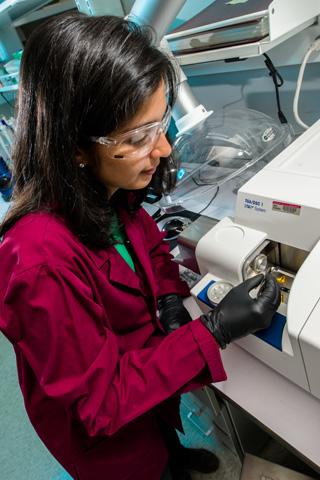The NCI-funded Nanotechnology Characterization Laboratory (NCL)—a leader in evaluating promising nanomedicines to fight cancer—recently renewed its collaboration with the U.S. Food and Drug Administration (FDA) and the National Institute of Standards and Technology (NIST) to continue its groundbreaking work on characterizing nanomedicines and moving them toward the clinic.
In partnership with NIST and the FDA, NCL has laid a solid, scientific foundation for using the power of nanotechnology to increase the potency and target the delivery of a new generation of precision cancer drugs.
The lab began in 2004 as part of what is now known as the NCI-sponsored Frederick National Laboratory for Cancer Research. Since then, NCL has developed and used its own assays, standards, and protocols to test more than 300 nanomaterials that were created by academic, government, and commercial laboratories across the country, and to assist 10 biotech companies in advancing novel nanomedicines into clinical trials.
“NCL has become a go-to lab for the assessment of nanomedicines,” said Piotr Grodzinski, Ph.D., director, NCI Office of Cancer Nanotechnology Research. “The lab has earned an international reputation in the area of characterizing nanomaterials used in cancer research and oncology, and plays a vital role in aiding to move nanotechnology-based therapies towards the clinic.”
Partnership Valuable to Understanding and Regulating Nanomaterials
The three-way partnership has been particularly effective in advancing the fundamental understanding, practical translation, and regulatory considerations of nanomedicines. NIST helps develop quantitative, reproducible measurement methods and protocols for nanoparticle characterization. It brings state-of-the-art instrumentation and expertise in physical characterization to the partnerships. The FDA advises on the types of testing needed for successful regulatory review. Data generated by NCL helps inform the FDA about unique safety and toxicity issues at the nanoscale.
Through its collaboration with NCL, NIST released its first nanoscale reference materials for biomedical applications in 2007, in the form of 10-, 30-, and 60-nm nominal-size gold colloids. These materials are being used for inter-laboratory testing to compare characterization techniques and instrumentation from laboratories across the country.
Senior FDA and NIST staff members, who serve on NCL’s Scientific Oversight Committee, review NCL-generated data and ensure that NCL’s assays capture key characterization attributes necessary for regulatory review.
Looking to the future, NCL has outlined a number of focus areas. Nanoformulation is becoming an early stage consideration for drug development, but it requires specialized expertise. There are no set guidelines for which particular nanoformulation will succeed with a particular drug.
“NCL has extensive experience in testing a wide variety of platforms in nanomedicine,” said NCL Scientist Jennifer Grossman, Ph.D. These platforms include polymers, dendrimers, liposomes, emulsions, and metal oxides, as well as protein-based, micellar, metallic, carbonaceous, and core-shell multifunctional nanomaterials, among others.
“Very few contract facilities have capabilities for reproducible synthesis of complex nanomedicines for Phase I and II trials,” Grossman said. This will need to change in order to accelerate progress in the field.
One area where there are still inadequacies in nanoparticle characterization is surface analysis, Grossman said. This is important for how a particle interacts with biological target molecules. Another area ripe for exploration is matching nanomaterial structures to biological effects.
Overall, the pharmaceutical industry is looking to federal and international regulatory agencies to develop a set of coordinated rules for reviewing and approving nanomedicines in the worldwide commercial marketplace.
“The pharmaceutical industry is global, and international collaborations in nanomedicine can improve standardization and quality control, and reduce the risk of adverse events,” Grossman said.
Feature photos courtesy of Pavan Adiseshaiah, Nanotechnology Characterization Laboratory.


